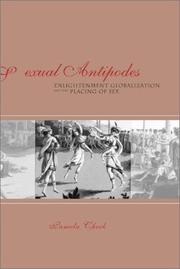
Sexual antipodes
By Pamela Cheek
Subjects: Travelers' writings, English, In literature, English literature, history and criticism, 18th century, Sex in literature, Comparative Literature, French literature, history and criticism, 18th century, Erotic literature, history and criticism, Imperialism in literature, Enlightenment, Travelers' writings, history and criticism, Globalization, Sex customs in literature, Travelers' writings, French, Comparative literature, Colonies in literature, English and French, French Erotic literature, History and criticism, French literature, English literature, History, English Erotic literature, French and English
Description: "The title refers to a premise in utopian and exoticist fiction about the southern portion of the globe: sexual order defines the character of the state. The book begins by examining how the idea of sexual order operated as the principle for explaining national differences in eighteenth-century contestation between Britain and France. It traces how, following British and French encounters with Tahiti, the comparison of different national sexual orders formed the basis for two theories of race: race as essential character and race as degeneration.". "The book's first major argument is that the comparison and definition of national sexual identities underwrote Enlightenment globalization - the novel Western European feeling of knowing one's place in a connected world. Its second major argument is that colonial representations of the Orient and the Antipodes functioned as the proving ground for competing claims about national character in the ongoing contestation between the Enlightenment's internal others, Great Britain and France. It thus proposes that competing claims about the role of sex in British and French public life - claims tested in British and French colonial representations - established the conditions for placing modern Western European sexual identity."--BOOK JACKET.
Comments
You must log in to leave comments.